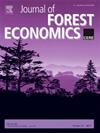Determinants of Household Fuelwood Consumption in Giant Panda Nature Reserves
IF 0.7
4区 农林科学
Q3 ECONOMICS
引用次数: 0
Abstract
Fuelwood collection is one of the main human activities threatening giant pandasâ habitats. The main purpose of this paper is to analyze the determinants of fuelwood consumption by households inside and around Chinaâs panda nature reserves. Finding these determinants is not only useful in understanding energy consumption behavior, but also for creating more effective policy to protect giant pandasâ habitats. We conducted a questionnaire survey in the Qinling mountain areas of Shaanxi province; 187 effective questionnaires from 16 villages in five nature reserves were collected and analyzed using a Tobit model. The results show that the average fuelwood consumption per household around panda nature reserves was 1.22 t in year 2017, and that there was no significant difference in fuelwood consumption between households inside or outside the nature reserves. Apart from household income, both the number of household members and ownership of energy-saving stoves show significant effects on fuelwood consumption. We conclude that the establishment of these nature reserves has not contributed towards decreasing fuelwood consumption inside the nature reserves, but it has transferred the harvesting location for fuelwood from inside the nature reserve to the outside. Since the increase in household income can significantly reduce the fuelwood consumption, policymakers should focus on how to increase rural household incomes to decrease fuelwood consumption. However, providing rural households around nature reserves with energy-saving stoves tends not to be an effective measure for reducing the fuelwood consumption.大熊猫自然保护区家庭木材消费的决定因素
采集火柴是威胁大熊猫栖息地的主要人类活动之一。本文的主要目的是分析中国大熊猫自然保护区内外家庭薪材消费的决定因素。找到这些决定因素不仅有助于了解能源消耗行为,也有助于制定更有效的政策来保护大熊猫的栖息地。我们在陕西秦岭山区进行了问卷调查;从五个自然保护区的16个村庄收集了187份有效问卷,并使用Tobit模型进行了分析。结果表明,2017年大熊猫自然保护区内每户平均薪材消耗量为1.22吨,自然保护区内外家庭的薪材消耗没有显著差异。除了家庭收入外,家庭成员的数量和节能炉灶的拥有量都对薪材消费产生了重大影响。我们得出的结论是,建立这些自然保护区并没有减少自然保护区内的薪材消耗,但它将薪材的采伐地点从自然保护区内部转移到了外部。由于家庭收入的增加可以显著减少薪材的消费,政策制定者应该关注如何增加农村家庭收入以减少薪材消费。然而,为自然保护区周围的农村家庭提供节能炉灶往往不是减少薪材消耗的有效措施。
本文章由计算机程序翻译,如有差异,请以英文原文为准。
求助全文
约1分钟内获得全文
求助全文
来源期刊

Journal of Forest Economics
农林科学-林学
CiteScore
1.70
自引率
0.00%
发文量
16
审稿时长
>36 weeks
期刊介绍:
The journal covers all aspects of forest economics, and publishes scientific papers in subject areas such as the following:
forest management problems: economics of silviculture, forest regulation and operational activities, managerial economics;
forest industry analysis: economics of processing, industrial organization problems, demand and supply analysis, technological change, international trade of forest products;
multiple use of forests: valuation of non-market priced goods and services, cost-benefit analysis of environment and timber production, external effects of forestry and forest industry;
forest policy analysis: market and intervention failures, regulation of forest management, ownership, taxation;
land use and economic development: deforestation and land use problem, national resource accounting, contribution to national and regional income and employment.
forestry and climate change: using forestry to mitigate climate change, economic analysis of bioenergy, adaption of forestry to climate change.
 求助内容:
求助内容: 应助结果提醒方式:
应助结果提醒方式:


